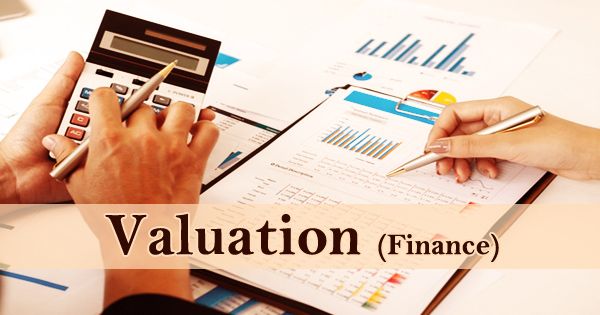Valuation is the analytical method in finance to assess the present (or projected) value of an asset or a company. Using a variety of methods can be achieved. Assets (e.g. investments in marketable securities such as stocks, options, commercial undertakings, or intangible assets such as patents, data, and trademarks) or liabilities (e.g. bonds issued by a company) may be assessed. Investigators that need to put an incentive on an organization typically take a gander at the administration of the business, the planned future profit, the market estimation of the organization’s resources, and its capital structure piece.
In valuation, fundamental analysis is mostly used, although many other models, such as the capital asset pricing model (CAPM) or the dividend discount model (DDM), can be used. In order to assess the correct tax liability, valuations are required for several purposes, such as investment analysis, capital budgeting, merger and acquisition transactions, financial reporting, and taxable events. It can also be utilized in determining a protection’s truthful cost, which depends on the amount that a customer is ready to pay a seller, with the belief that each event will input the transaction.
Corporate results or economic developments that cause analysts to retool their valuation models may rapidly affect valuations. Sellers and buyers can dictate the market value of a bond or stock during the trading of a security on an exchange. Market value, fair value, and intrinsic value are general expressions for the value of an asset or liability; the definitions of those terms vary. A valuation can be helpful when attempting to decide the reasonable estimation of security, which is dictated by what a purchaser is happy to pay a vendor, expecting the two players to enter the exchange readily.

(Valuation)
For example, an analyst makes a “buy” (or “sell”) recommendation when an analyst assumes the intrinsic value of a stock is greater (or less) than its market price. Intrinsic value, however, is a term that refers to the expected value of a security on the basis of potential profits or other characteristics of the company that are not linked to the market value of a security. In this manner, crafted by experts while doing valuation is to know whether a resource or an organization is underestimated or exaggerated by the market. At the point when security exchanges on a trade, purchasers, and vendors decide the market estimation of a stock or security.
In finance, for many purposes, including tax assessment, wills and estates, divorce settlements, business analysis, and basic bookkeeping and accounting, valuation analysis is needed. Business valuation is a valuable exercise for a company as it will help to develop the company. Here are some of the reasons why a company assessment should be carried out.
- Litigation – We will need to include evidence of the value of our company in a court case such as an accident case, divorce, or where there is a dispute with the value of the company so that they are focused on the true value of our companies in the event of any losses and not exaggerated estimates estimated by a lawyer.
- Exit strategy planning – In examples where there is an arrangement to sell a business, it is savvy to concoct a base an incentive for the organization and afterward think of a procedure to improve the organization’s benefit in order to build its incentive as a leave methodology. Our business leave system needs to begin early enough before the exit, tending to both automatic and willful exchanges. A yearly revised valuation will keep the company primed for unforeseen and planned revenues. It would also ensure that we have accurate information on the fair market value of the company and avoid loss of capital due to lack of clarification or inaccuracies.
- Buying a business – While sellers and buyers typically have different opinions on the value of the company, what the buyers are willing to pay is the real business value. To ensure that the investment we are making is sustainable, a successful business valuation would look at market dynamics, future profits, and other related concerns. Hiring a company broker who can assist us with the process might be wise.
- Selling a business – While we want to promote our business or company to a 3rd birthday celebration, we need to make certain that we get what it is worth. The asking fee should be appealing to prospective consumers; however, we need to not leave money at the table.
- Strategic planning – In a depreciation plan, the true value of assets cannot be seen, and if the balance sheet has not been updated for numerous future adjustments, it may be risky. Getting a current company valuation would give us good data to help us make better business decisions.
- Funding – An goal valuation is typically needed when we want to barter with banks or any other potential traders for investment. Professional documentation of our enterprise’s well worth is typically required because it complements our credibility to the creditors.
- Selling a share in a business – Proper business valuation helps us to know the value of our shares for business owners and be ready when we want to sell them. We should ensure that no money is left on the table and that we get good value from our share, just as during the selling of the company.
Supreme valuation models endeavor to locate the inherent or “valid” estimation of a venture dependent on essentials. Valuation models that fall into this classification incorporate the profit rebate model, limited income model, leftover pay model, and resource-based model. Since the estimation of things changes over the long haul, valuations are starting at a particular date like the finish of the bookkeeping quarter or year. In addition, relative valuation models work by contrasting the business in question with other related firms. These strategies include measuring and comparing multiples and ratios, such as multiple price-to-earnings, to the multiples of similar firms.
Users of valuations gain when key statistics, assumptions, and obstacles are disclosed to them. Then they could weigh the diploma of reliability of the end result and make their selection. There are various approaches to do a valuation. The discounted coins waft evaluation noted above is one method, which calculates the cost of an enterprise or asset based on its earnings capacity. Other approaches include looking at prior and equivalent business or asset acquisition transactions or comparing a company with similar firms and their valuations. Most practitioners see valuations, both in the present and in the future, as a fundamental basis of proper decision-making for organizations.
There may be additionally the asset-based valuation technique, which provides up all of the organization’s asset values, assuming they have been bought at truthful market price, to get the intrinsic price. Enterprise proprietors who move for low-cost valuations frequently leave out on the substantial benefits added by way of appearing a complete valuation analysis using certified valuation specialists. It’s easy to become overwhelmed by the number of valuation techniques available to investors when determining which valuation approach to use to value a stock for the first time. Company owners can negotiate their entity’s tactical sales, plan an exit strategy, secure funding, and reduce the financial burden during litigation.
Information Sources:
















